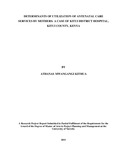| dc.contributor.author | Kithua, Athanas Mwangangi | |
| dc.date.accessioned | 2015-09-04T10:49:02Z | |
| dc.date.available | 2015-09-04T10:49:02Z | |
| dc.date.issued | 2015 | |
| dc.identifier.citation | Master of Arts in Project Planning and Management | en_US |
| dc.identifier.uri | http://hdl.handle.net/11295/90499 | |
| dc.description.abstract | Maternal mortality remains a huge public health problem in Africa as a whole and Kenya is
not excluded. One of the strategies to improve maternal health is the implementation and
appropriate use of antenatal care (ANC) services in which at least four visits are
recommended during one pregnancy. Utilization of ANC services is influenced by several
factors that vary from one country to another. The aim of this study was to establish the
determinants of utilization of antenatal care services among mothers in Kitui district hospital
in Kitui County, Kenya. The determinants which were explored include waiting time for
services, privacy of antenatal care services and client information, health workers’ attitude,
services integration and operating hours of the antenatal clinic. The level of utilization of
ANC services in the hospital was also established. The study design was a case study which
was conducted among postnatal mothers seeking post natal services in Kitui district hospital.
The postnatal mothers included were those whose children were below 9 months of age. The
target population was 2927 mothers. A sample of 338 postnatal mothers for the study was
obtained guided by Krejcie and Morgan table for determining sample size from a defined
population. Purposive sampling was used in the study whereby consenting clients who met
inclusion criteria were enrolled cumulatively until the required sample size was obtained. One
structured questionnaire was used to obtain data from study participants and a structured
interview schedule was used for mothers who were unable to fill the questionnaires. After
data collection, it was analysed using descriptive statistics which involved frequency
distribution tables and percentages. The results of the study showed that utilization of
antenatal care services is influenced by waiting time (chi-square value of 30.781), health care
workers attitude (chi-square value of 16.621), privacy of services (chi-square value of 86.633)
and service integration (chi-square value of 153.379). Most of the respondents (75.4%)
indicated that waiting time had influence on utilization of ANC services. Health care workers’
attitude was mentioned by 63% of respondents as having an influence on utilization of ANC
services. 69.2% of the respondents strongly agreed that privacy of services influences
utilization of ANC services. However, 63% of the respondents indicated that clinic operating
hours have no influence on utilization of antenatal care services. Majority of the responded
(97.6%) also indicated that service integration influenced utilization of ANC services. The
study recommended that the hospital should improve on the privacy of the rooms where ANC
services are offered and train health workers on effective communication and attitude change.
The government should also employ more staff to improve health worker to client ratio with
an aim of reducing the waiting time. | en_US |
| dc.language.iso | en | en_US |
| dc.publisher | University of Nairobi | en_US |
| dc.title | Determinants of utilization of antenatal care services by mothers: a case of Kitui district hospital, Kitui county, Kenya | en_US |
| dc.type | Thesis | en_US |
| dc.type.material | en_US | en_US |

